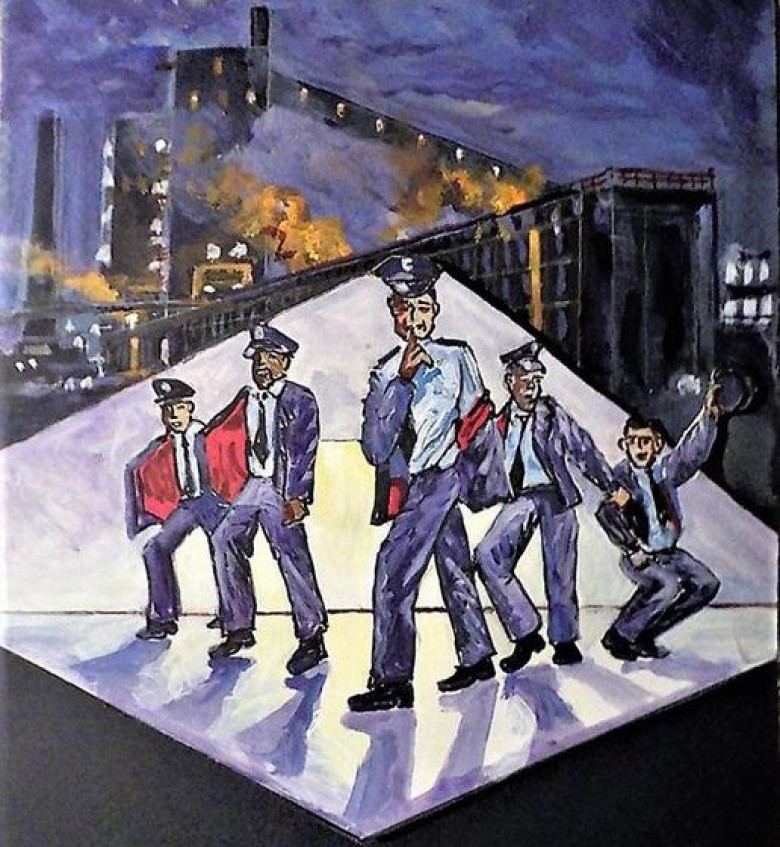The Full Monty is full on at Subversive Theatre Collective in a two act, almost three-hour marathon of blue collar angst and glory, with a large cast and a great deal of laughter, as well as moments of sadness and sweet tenderness.
Based on the 1997 British comedy film, the musical with book by Terrence McNally, music and very clever lyrics by David Yazbek, is set in Buffalo in the 1980s when Bethlehem Steel and other factories closed, unemployment lines were long, and men who had little education and very few prospects sat in union halls feeling like “Scrap,” not knowing when or if they would ever find work again. It was the era of “trickle down economics,” cheap steel imports, and the flight of factories to the South, Mexico, and Asia, where cheap goods and labor cut costs and raised dividends for shareholders and salaries for CEOs. Laborers in the northeast factory towns, which came to be known as the Rust Belt, suffered great losses, many never finding sustaining work again.
This is the world in which the men and women in The Full Monty live and struggle to maintain their families and their dignity. While the musical is a very funny, often laugh-out-loud comedy, it also explores the impact of unemployment in the loss of pride, depression, suicide, and impotence, along with general themes of body image and shaming, homosexuality, grief, and the myth of the “big” black man.
Jerry (Anthony Alcocer) and his best buddy Dave (Jeffrey Coyle) are both unemployed steelworkers. Jerry is divorced from his high school sweetheart, has a 12-year-old son he adores, a history of car theft and incarceration, and an ego that will not allow him to take on work he considers beneath him, like being a security guard at the Boulevard Mall. Dave is still married and in love with his high school sweetheart, has grown a huge belly, and feels like a big blob. They sneak into the bathroom at a Chippendales show where Dave’s wife is celebrating with friends, “It’s a Woman’s World.” They overhear Jerry’s ex-wife say she is taking him to court to gain full custody of their son because of his lack of child support payments. Devastated, and after confronting one of the gay Chippendale dancers and finding out how much money is made in a single night, Jerry has the brilliant idea that he and Dave and other “regular” guys could put on a strip show themselves. And, so they do…
Direction is by Susan Forbes, with musical direction by Cindy Bottoms-Noller, and choreography by Nancy Hughes–all women, you might note-which is unusual here outside of Brazen-Faced Varlets, if I am not mistaken. And if I am, I am sure I will hear about it. Kudos all around.
I particularly liked Ms. Hughes’ choreography in the early number “Scraps” that takes place in the union hall with the men using folding chairs to emphasize their anger and sense of uselessness. As they dance with the chairs, slamming them shut and using them as weapons, we feel their intense frustration. The standout number of the evening is “Michael Jordan’s Ball,” in which the men, struggling to do the sexy pelvic thrusts required in stripping, use the graceful basketball moves they learned in high school from watching Jordan to get in the groove. Very well done. And the ladies with the little devil horns in “The Goods” are no slouches, either, as they mock the men who are agonizing over the condition of their bodies.
The large cast handles the material well, for the most part. Anthony Alcocer and Jeffrey Coyle work well together, playing off each other in some very funny and occasionally touching moments. Mr. Alcocer never runs out of steam as he jumps from the upstage platform more than once, sings his heart out, and rallies his troops to hang in and fight. Mr. Coyle is charming and funny as the chubby Dave, with his low self-esteem and love of potato chips. He has a sweet voice and a graceful manner that belie his belief that he is unloveable. The interactions between Mr. Alcocer and Alejandro Perez as his son, Nathan, are a bit awkward at times, possibly due to the nature of the relationship, wherein the son is more like father to the man. Alley Griffin shines as Georgie, Dave’s lovesick wife, who belts out "It's a Woman's World" with the ensemble, and tries everything she can think of to get her man to respond to her again. Pamela Rose Mangus kills it as the old broad, wise piano player Jeanette, who has played with the best of them, from Buddy Greco to Sinatra, and is not shy about letting everyone know it. Tim Goehrig and Connor Graham have a lovely duet, “You Walk with Me,” that is sweet and heartfelt. Jaime Goldfuss starts it all off in a suit, stripping down to a g-string and lap dancing with nary a twinge of shyness. There are many others in the cast, and each has a moment or two-Victor Morales’ attempt at stripping is very funny, Jamie Nablo and the ensemble do justice to “Life with Harold,” and Thomas LaChiusa as the bean-counter Harold, and Alfonzo Tyson as Horse, the black man with the potentially large penis, have some very funny moments. Ah, but who really does have that large appendage? I’m not telling. You will have to find out for yourself.
There is much to love about this production, which is uneven at times, suffered a bit from some opening night jitters, and is a tad long. The length has more to do with all the different elements the playwright squeezed in, than with this production. It has great energy, is very entertaining and funny. It is an excellent choice for Subversive Theatre Collective, as it highlights the plight of the working class while being very entertaining right up to the very last moment.

